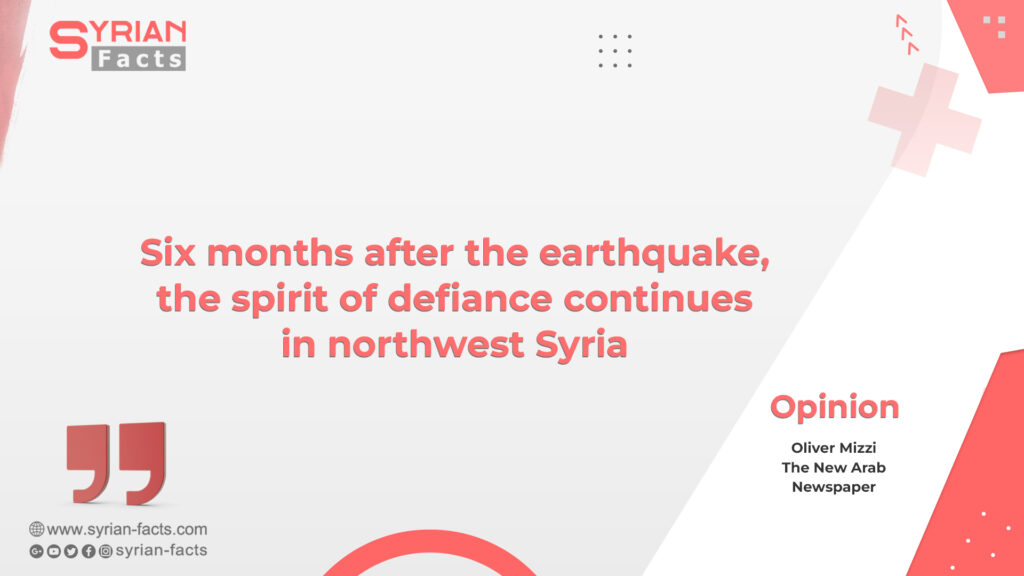In the aftermath of Syria’s earthquake, The New Arab spoke to three organisations operating in northwest Syria to understand how they have adapted to the situation in the six months following the devastation.
Six months on, northwest Syria is still suffering from the humanitarian aftershocks of the February 6 earthquake that devastated much of the region.
The organisations that inhabit it have struggled to cope with the pressures caused by the earthquake, which after 12 years of war has only “aggravated and increased the intensity of this suffering” felt in northwest Syria, Mounir Al-Mustafa, Deputy Director of the Syrian Civil Defence for Humanitarian Affairs tells The New Arab.
However, throughout the last six months civil society organisations like the Syrian Civil Defence, also known as the White Helmets, have attempted to absorb the tremors of the earthquake and even plan the expansion of their operations to alleviate the suffering brought about by both the natural disaster and the war.
One such organisation is Hurras, whose main office is in Gaziantep. Its cross-border operations, which sees it operate in 115 schools across northwest Syria providing educational and protection services to 21,500 able-bodied and disabled children, were severely disrupted by the February earthquake.
Communications between its main office and areas of operation were cut, leaving staff with a lack of information about how the earthquake affected their personnel.
“We had no idea about the extent of the damage caused by the earthquake in Syria, and we could only obtain information after leaving the city,” Majdi Bashimam, their programme director based in Gaziantep, told The New Arab.
That information only started trickling in after four days, when it was finally revealed that staff in the organisation, and their close relatives were safe.
This could not be said of members of the White Helmets who lost four volunteers alongside their families, with the rest using the crucial 72-hour timeframe to rescue survivors as part of a responsethey described as a “mammoth effort.”
Another organisation, Mazaya, told The New Arab that one of their colleagues had been killed under the rubble. Wafaa Al-Suwayd, who works for Mazaya, said that its office in Salqin had suffered huge levels of damage as “most of the assets we had in our office were destroyed.”
What added insult to injury was that it was the second time Mazaya had been displaced. It had previously moved its office to Salqin following the regime recapture of Kafr Nabl in 2020.
Mazaya, an organisation that empowers women in the “arena of political, social, cultural and economic life,” found it difficult to adapt to the disaster situation as it struggled to replace what was lost in the earthquake with its members now dispersed across northwest Syria, some being located in its displaced persons camps.
“Women suffer from a lack of consideration or care for their needs as a result of the overcrowding in the refugee centres,” with the struggles of civil society in dealing with the situation feeding into “feelings of helplessness” experienced by women in the region, Umayyah Al-Shaker, a member of Mazaya, told The New Arab.
What’s worse, Umayyah spoke of a “resentment at the international community” which left Syrians “to confront their fate and rescue each other” with substantially less help than their Turkish neighbours, who didn’t have to face a politicisation of aid deliveries.
It took a week for the Syrian regime to allow the UN to use the border crossings at Bab al-Salam and al-Ra’ee, with only the Bab al-Hawa border crossing being open to aid initially.
These sentiments were echoed by the White Helmets, with Mounir saying that the UN had left Syrians “to face their fate,” as the organisation was, along with civilians, “the only organisation capable of dealing with this type of disaster operating in northwest Syria.”
“In the six months since the disaster, the earthquake and its repercussions have taken up the greatest share of the work being done by the Syrian Civil Defence,” Mounir added.
However, he noted that the “US, Canada, Britain and Qatar have offered humanitarian aid in the framework of the earthquake response, and supported rescue and recovery operations.”
After the initial response, the White Helmets moved to repair and recovery work like unblocking roads, and securing infrastructure that was in danger of collapsing.
These efforts were done simultaneously with responding to floods, accidents, and fires, as well as regime and Russian bombardments that killed one of its members in July.
Hurras uses the school infrastructure in the region to provide its services, however, 551 schools were either damaged or destroyed, with over 2,000 children and 43 teachers also losing their lives.
This meant that it became imperative for Hurras to reopen schools to support the activities of children and, more importantly, offer psychological aid to children traumatised by their experiences.
The earthquake, combined with the prospect of a cessation of aid into northwest Syria — as happened through July when Russia vetoed the continued use of the Bab al-Hawa border crossing for UN aid deliveries — has led to an increase in anxiety, trauma, and mental health issues for children in the northwest Syria.
Yet, through this Hurras has done its best to support children, including those with disabilities, during the worst of the earthquake’s aftermath.
Maimouna al-Ammar, who works for the organisation, told The New Arab that through weekly sessions, children in northwest Syria were taught a number of techniques that helped them manage their anxiety.
Since the earthquake, all three organisations have set out plans to strengthen their work in northwest Syria. According to Maimouna, Hurrass, the organisation will start “transitioning from a reactive, emergency-focused approach to empowering the community and its institutions.”
Included in this will be the creation of services that conduct “psychological therapy, rehabilitation, and the integration of person with disabilities,” and “placing protection principles at the heart of relief effort.”
The White Helmets are also looking to expand their work into securing better infrastructure for northwest Syria, with an aim to lay new roads, repair bridges and enhance sewage networks. Included in this is a project aimed at extending the drinking water and sewage networks at the Kafr Karmin camps in western Aleppo.
The organisation will also continue to call for the implementation of UN Security Council Resolution No. 2254 which sets out a roadmap for a political solution to the war in Syria.
Mounir added that alongside the practical efforts is a “dream of a future in which we rebuild Syria side by side with all Syrians in a homeland where justice and peace prevail.”
It’s a sentiment shared deeply by Mazaya, whose plans of expanding the digital and geographical reach of the organisation to help women across northwest Syria are embedded in a spirit of determination.
It’s in that spirit that Umayyah told The New Arab, “We in Mazaya have a firm stance regarding the revolution, and despite the weaknesses of our abilities, we will continue working on the advancement of our society, every part of it because our children deserve a better future.”
The New Arab Newspaper





Be the first to write a comment.